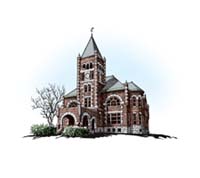 |
 |
| current issue |  |
past issues |  |
send a letter/news |  |
address update |  |
advertise |  |
about us |  |
alumni home |
The View from T-Hall
In Safe HandsBy President Mark W. Huddleston

|
SPRINGTIME AT UNH BRINGS HAPPY THOUGHTS TO MIND—the close of another semester, Frisbee on T-Hall lawn, water fights in the Quad and commencement. Yet just a few weeks ago, we marked the first anniversary of the Virginia Tech tragedy, where, in April 2007, a gunman killed 32 people and wounded many others before fatally turning the gun on himself. It was not only the deadliest school shooting, but the deadliest shooting rampage by a single gunman in all of U.S. history. Others have followed: Northern Illinois University, Delaware State University and Louisiana Technical College. As president—and someone who lives on the Durham campus with his family—I want to take a moment to share with you some of the steps we have taken over the past 12 months to make our community safer. I am indebted to UNH Deputy Chief of Police Paul H. Dean for compiling the information that appears in this column.
First, I want our alumni and friends to know that UNH is on the cutting edge of emergency management in higher education and that we are a model for many institutions across the country.
A week after the horror of Virginia Tech, UNH alumnus John Olson '57 gave UNH a state-of-the-art outdoor emergency notification system. Thankfully, we have not had to use it yet, but should the need arise, the system's broadcast can be heard by anyone within a 7-mile radius. John is president and CEO of Whelen Engineering Company, which manufactures notification systems for schools and communities around the nation. We are truly grateful for this gift.
The university has also invested in other state-of-the-art communications technologies. An extensive mass notification system allows us to send text and e-mail messages during any emergency. The average time it takes for a person to receive an emergency text message is 40 seconds. We urge our students, staff and faculty members, and parents to enroll in this program. If you have not done so, and wish to be notified in the case of a campus emergency, please register at https://alert.unh.edu. When you receive the emergency alert, it will direct you to the university's web site (www.unh.edu), where you can read the latest information.
Our information technology staff has also enhanced the university's directed communication capabilities so that we may now reach 22,000 people via e-mail in a matter of seconds. And if an emergency happens on campus, our university police and communications teams will work very closely together to put the latest information on the UNH web site—no matter if it's 2 o'clock in the afternoon or 2 o'clock in the morning.
University senior management and emergency group members have been trained in the Federal Emergency Management Agency's incident command system and crisis response program. If an emergency occurs on campus, everyone involved will have a role, and they will all know what that role is.
Under the leadership of Senior Assistant Vice President for Student and Academic Services Anne Lawing, we have formed a crisis intervention team, or "care team," to work with individuals experiencing emotional difficulties who may pose a threat to themselves or others. Although this is a new initiative, the team has already seen improvements in communication among faculty and staff members and students around these issues.
We have examined and made changes to the security of our buildings on campus. The housing department, in cooperation with UNH Facilities, has conducted an aggressive review of the locking system in our campus residence halls to make sure student living spaces are even more secure.
A UNH police officer is assigned to the Drug Enforcement Administration clandestine lab team as part of an effort to improve the security of our campus labs and any controlled substances and hazardous materials that they house. We are also developing a camera system to be monitored by the UNH Police Communications Center and exploring eye-scan access technology for some of our laboratories.
Officers in our police department have been assigned to, and trained by, Strafford County SWAT as specialists to handle potentially violent incidents that might affect our campus, and we have formed a new partnership with the Red Cross to respond and assist during an emergency.
As we reflect on those who lost their lives in acts of senseless violence on other campuses this past year, let us honor their memories by making our own campus as safe as possible. Just a few years ago, emergency preparedness was barely on the radar for most of us in higher education; it is now part of our daily conversations. I am proud of, and comforted by, the many ways in which UNH is a leader in emergency management.
blog comments powered by Disqus
